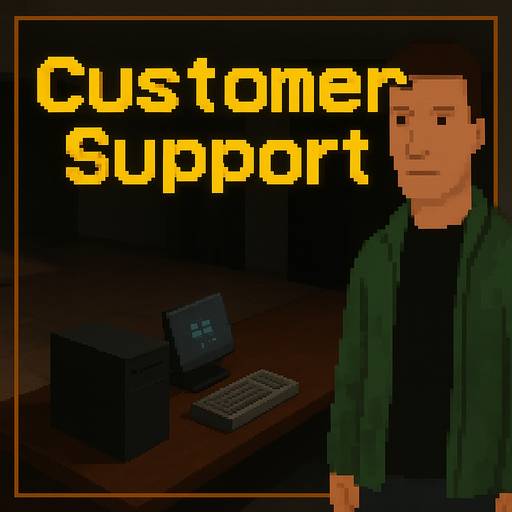| Rating: | 5 (1 votes) |
| Played: | 264 times |
| Platform: | Desktop, mobile |
| Technology: | HTML5 |
| Classification: | Casual Games |
Customer Support is a simulator game that cleverly blends everyday job tasks with psychological horror elements. On the surface, you’re simply working the night shift at a supermarket, unlocking the doors, answering calls, and completing customer requests. But as time passes, this ordinary workplace setting transforms into something far darker. The silence grows heavier, the lights behave strangely, and phone calls take on an increasingly sinister tone. What makes the game truly unique is its ability to turn the stress of a typical retail job into a chilling survival experience, where every mistake could cost more than just your paycheck.
The Customer Support game takes familiar duties like stocking shelves and following instructions and places them in an environment that grows increasingly hostile. Players quickly realize that routine tasks are no longer safe; they become nerve-wracking challenges filled with tension and unease.
Each phone call from your boss or a faceless customer reinforces the sense that you’re never alone. Even when no one is visibly watching, the game makes you feel scrutinized, judged, and punished for the smallest slip-ups, amplifying the anxiety of working under strict authority.
Unlike many horror games that rely on grotesque creatures or loud jump scares, Customer Support relies on subtle details. Flickering lights, unexplained sounds, and empty aisles become sources of dread. The horror is psychological, leaving players second-guessing their own senses.
Decisions matter in Customer Support. Whether you follow instructions perfectly, ignore strange details, or hesitate when something feels off, your actions affect how the story unfolds. This branching design ensures no two playthroughs feel the same.
Perhaps the most unsettling aspect of the game is how it mimics the repetitive grind of real-life retail work. The loop of answering calls, completing tasks, and reporting back becomes oppressive. Over time, this cycle feels less like routine and more like a trap that pulls you deeper into the nightmare.
